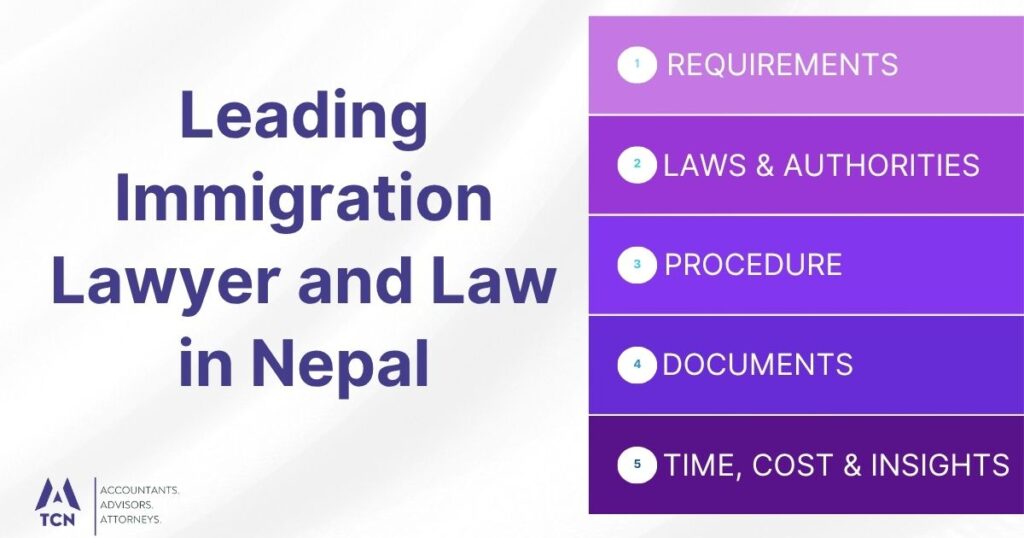Introduction to Immigration Law in Nepal
Nepal’s immigration law framework governs the entry, stay, and exit of foreign nationals within the country’s borders. The Immigration Act, 2049 (1992) and Immigration Regulation, 2051 (1994) serve as the primary legal instruments regulating immigration matters in Nepal. These laws establish comprehensive guidelines for visa applications, work permits, residence permits, and other immigration-related procedures.
Immigration lawyers in Nepal play a crucial role in navigating the complex legal landscape surrounding foreign nationals’ rights and obligations. They provide essential services including visa applications, work permit processing, investment visa guidance, and legal representation in immigration disputes. The Department of Immigration under the Ministry of Home Affairs serves as the primary regulatory body overseeing immigration matters.
The legal profession in Nepal operates under the Nepal Bar Council Act, 2050 (1993), which regulates legal practitioners and ensures professional standards. Immigration lawyers must possess valid licenses from the Nepal Bar Council and demonstrate expertise in immigration law, international law, and related regulatory frameworks.
Foreign nationals seeking immigration services in Nepal require professional legal assistance due to the intricate nature of immigration procedures, documentation requirements, and compliance obligations. Leading immigration lawyers provide comprehensive services ranging from initial consultation to final permit acquisition, ensuring clients meet all legal requirements under Nepalese immigration law.
Requirements for Immigration Legal Services
Educational and Professional Qualifications
Immigration lawyers in Nepal must hold a Bachelor’s degree in Law (LLB) from a recognized university and pass the Nepal Bar Council examination. They must maintain active membership with the Nepal Bar Council and complete continuing legal education requirements. Specialized knowledge in immigration law, foreign investment regulations, and international legal frameworks enhances their professional competency.
Licensing and Registration Requirements
Legal practitioners must obtain a valid license from the Nepal Bar Council under Section 7 of the Nepal Bar Council Act, 2050. They must register their practice with relevant local authorities and maintain professional indemnity insurance. Immigration lawyers handling foreign investment cases must understand the Foreign Investment and Technology Transfer Act, 2075 (2019) and related regulations.
Professional Experience and Expertise
Leading immigration lawyers typically possess extensive experience in handling diverse immigration cases, including tourist visas, business visas, work permits, and investment visas. They maintain updated knowledge of bilateral agreements, international treaties, and diplomatic protocols affecting immigration procedures. Professional networks with government agencies, embassies, and international organizations enhance service delivery capabilities.
Ethical and Compliance Standards
Immigration lawyers must adhere to professional ethics codes established by the Nepal Bar Council. They must maintain client confidentiality, avoid conflicts of interest, and provide competent legal representation. Compliance with anti-money laundering regulations and know-your-customer requirements ensures ethical practice standards in immigration law services.
Detailed Process for Immigration Legal Services
Step 1: Initial Consultation and Case Assessment
Immigration lawyers conduct comprehensive consultations to understand clients’ specific immigration objectives and circumstances. They review existing documentation, assess eligibility criteria, and identify potential legal challenges. Lawyers evaluate visa categories, work permit requirements, and investment thresholds under the Foreign Investment and Technology Transfer Act, 2075. They provide preliminary legal advice regarding procedural timelines, documentation requirements, and potential outcomes. This initial assessment forms the foundation for developing customized immigration strategies tailored to individual client needs.
Step 2: Documentation Preparation and Verification
Lawyers assist clients in gathering, preparing, and verifying required documentation according to immigration regulations. They ensure all documents meet authenticity requirements, including notarization, apostille certification, and translation into Nepali language where necessary. Legal practitioners coordinate with relevant authorities to obtain character certificates, medical reports, and financial statements. They prepare legal applications, cover letters, and supporting documentation in compliance with Department of Immigration guidelines. Document verification includes cross-checking against immigration checklists and regulatory requirements to prevent application rejections.
Step 3: Application Submission and Follow-up
Immigration lawyers submit completed applications to the Department of Immigration or relevant diplomatic missions on behalf of clients. They maintain detailed records of submission dates, reference numbers, and processing timelines. Lawyers coordinate with immigration officials to address queries, provide additional documentation, and resolve procedural issues. They monitor application status through official channels and provide regular updates to clients. Professional relationships with immigration authorities facilitate efficient communication and expedited processing where applicable under existing regulations.
Step 4: Legal Representation and Advocacy
Lawyers provide legal representation during immigration interviews, hearings, and appeals processes. They prepare clients for official interactions with immigration authorities and provide guidance on appropriate responses to official inquiries. Legal practitioners advocate for clients’ interests in cases involving application rejections, permit cancellations, or deportation proceedings. They draft legal briefs, prepare evidence, and present arguments before immigration tribunals or courts. Professional advocacy ensures clients’ rights are protected throughout the immigration process under Nepalese law.
Step 5: Post-Approval Compliance and Ongoing Support
Immigration lawyers assist clients in understanding and fulfilling post-approval obligations under immigration law. They provide guidance on permit renewal procedures, reporting requirements, and compliance obligations. Lawyers help clients navigate tax obligations, work authorization restrictions, and residency requirements. They maintain ongoing relationships to address future immigration needs, including family reunification, permanent residency applications, and citizenship procedures. Continuous legal support ensures clients remain compliant with evolving immigration regulations and maintain their legal status in Nepal.
Documents Required for Immigration Legal Services
Personal Identification Documents
Foreign nationals must provide valid passports with minimum six months validity and recent passport-sized photographs meeting Department of Immigration specifications. Birth certificates, marriage certificates, and family relationship documents require authentication and translation into Nepali language. Educational certificates, professional qualifications, and employment records must be verified through appropriate channels.
Financial and Background Documentation
Applicants must submit bank statements, income certificates, and financial guarantee letters demonstrating sufficient funds for their intended stay. Character certificates from home countries and previous countries of residence require authentication through diplomatic channels. Medical certificates from authorized healthcare providers confirm health status and absence of communicable diseases.
Purpose-Specific Documentation
Business visa applicants must provide company registration documents, investment proposals, and letters of invitation from Nepalese entities. Work permit applicants require employment contracts, employer recommendations, and professional qualification certificates. Investment visa applicants must submit detailed business plans, financial projections, and compliance certificates under the Foreign Investment and Technology Transfer Act, 2075.
Legal and Compliance Certificates
All foreign documents require apostille certification or embassy authentication depending on bilateral agreements between Nepal and the applicant’s home country. Translation certificates from authorized translators ensure document authenticity and legal validity. Insurance certificates, tax clearance certificates, and other compliance documents may be required based on specific visa categories and intended activities in Nepal.
Time Frame and Cost Structure
Processing Timelines
Standard tourist visa processing typically requires 3-5 working days through diplomatic missions or on-arrival facilities at designated entry points. Business visa applications generally take 7-15 working days depending on documentation completeness and verification requirements. Work permit processing extends to 15-30 working days, involving multiple government agencies and compliance checks.
Investment visa applications under the Foreign Investment and Technology Transfer Act, 2075 may require 30-60 working days due to comprehensive evaluation processes. Complex cases involving appeals, legal challenges, or additional documentation may extend processing timelines significantly. Expedited processing options are available for certain visa categories with additional fees.
Legal Service Fees
Immigration lawyer fees vary based on case complexity, service scope, and professional experience levels. Initial consultation fees typically range from NPR 2,000 to NPR 10,000 depending on lawyer expertise and case requirements. Comprehensive immigration services including documentation, application processing, and legal representation may cost NPR 25,000 to NPR 200,000 or more for complex cases.
Government fees for visa applications, work permits, and other immigration services are established by the Department of Immigration and updated periodically. Additional costs include document authentication, translation services, medical examinations, and travel expenses for official procedures.
Cost-Benefit Analysis
Professional legal assistance significantly improves application success rates and reduces processing delays caused by documentation errors or procedural non-compliance. Immigration lawyers provide valuable expertise in navigating complex regulatory requirements and avoiding costly mistakes. Long-term benefits include proper legal status maintenance, compliance assurance, and access to ongoing legal support for future immigration needs.
Post-Registration Obligations and Compliance
Reporting and Registration Requirements
Foreign nationals must register with local police authorities within 24 hours of arrival in Nepal as mandated by the Immigration Regulation, 2051. They must maintain updated registration records and report address changes to relevant authorities. Work permit holders must comply with employment reporting requirements and notify authorities of job changes or employer modifications.
Permit Renewal and Extension Procedures
Visa extensions and permit renewals require timely applications before expiration dates to avoid legal penalties and status violations. Immigration lawyers assist clients in preparing renewal applications, updating documentation, and meeting evolving regulatory requirements. Continuous legal status maintenance prevents deportation risks and ensures uninterrupted stay authorization.
Tax and Financial Compliance
Foreign nationals with income sources in Nepal must comply with tax obligations under the Income Tax Act, 2058 (2002). They must obtain tax identification numbers, file annual returns, and maintain proper financial records. Investment visa holders must comply with foreign exchange regulations and reporting requirements under the Foreign Exchange Regulation Act, 2019 (1962).
Legal Status Monitoring
Immigration lawyers provide ongoing monitoring services to ensure clients maintain proper legal status throughout their stay in Nepal. They track regulatory changes, policy updates, and bilateral agreement modifications affecting immigration procedures. Professional legal support helps clients adapt to evolving requirements and maintain compliance with current immigration law.
Frequently Asked Questions
What services do leading immigration lawyers provide in Nepal? Immigration lawyers offer comprehensive services including visa applications, work permits, investment visa guidance, legal representation in disputes, documentation assistance, compliance advice, and ongoing support for foreign nationals navigating Nepal’s immigration system.
How do I choose a qualified immigration lawyer in Nepal? Select lawyers with valid Nepal Bar Council licenses, specialized immigration law experience, proven track records, professional references, updated regulatory knowledge, and comprehensive service offerings matching your specific immigration needs and objectives.
Where can I find authorized immigration lawyers in Nepal? Authorized immigration lawyers practice in major cities including Kathmandu, Pokhara, and Chitwan. Contact the Nepal Bar Council, legal directories, professional associations, or diplomatic missions for verified lawyer referrals and credentials verification.
What are the basic requirements for hiring immigration legal services? Requirements include valid identification documents, clear immigration objectives, necessary supporting documentation, financial capacity for legal fees, willingness to comply with legal procedures, and commitment to maintaining proper legal status.
How much do immigration legal services cost in Nepal? Immigration legal service costs range from NPR 25,000 to NPR 200,000 depending on case complexity, service scope, lawyer experience, government fees, documentation requirements, and additional procedural expenses for comprehensive immigration assistance.


